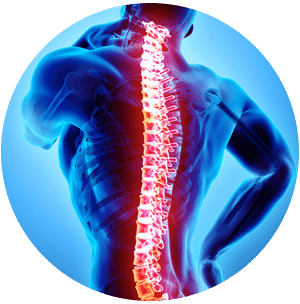Proliance Spine Center
The Proliance Spine Center provides complete care for conditions related to the spine, neck, and back. The spine surgeons at Proliance Spine Surgeons of Puget Sound, working with three separate groups, lead an integrated team to provide the full spectrum of non-operative and operative spine care.
Request Appointment
Our spine specialists work as a team to provide the full spectrum of non-operative and operative spine care in our brand new advanced clinic and surgical facility.
A distinct difference you’ll notice at Proliance Spine Center is that you will receive specialized care under the direction of your doctor. We do not have any interns or fellowship trainees in our facility. Whether you’re in the clinic or operating room, your expert surgeon will be the one taking care of you. Our patient-centric approach to the treatment of conditions affecting the spine, neck, and back ensures you will have the best treatment plan and care possible.
Proliance Spine Surgeons of Puget Sound
Our experienced board-certified and fellowship-trained spine surgeons form the foundation of the Proliance Spine Center. Skilled in all facets of both operative and non-operative care, our surgeons have specialized training and knowledge of advanced, minimally invasive surgical procedures such as cervical disc replacement, interlaminar stabilization (non-fusion alternative), and outpatient spine surgery.
Rehabilitation Sports & Spine
All of our board-certified Physiatrists have over 20 years of experience in the evaluation and management of non-operative conditions affecting the spine, neck, and back. Whether it is directing a comprehensive physical therapy program, providing interventional pain management injections, or utilizing specialized electrodiagnostic studies, our skilled providers are an integral part of the Proliance Spine Center.
Visit www.rehabsportsandspine.com to learn more about the physical medicine and rehabilitation team members.
Northwest Pain Management
Our board-certified, fellowship-trained Anesthesiologists specialize in managing chronic pain using the newest state-of-the-art techniques in Interventional Pain Management. With growing awareness of the opioid crisis in this country, there is a need for better ways to manage pain without narcotics. The highly skilled physicians at Northwest Pain Management are at the forefront of this movement. They are leaders in the Northwest region and have the goal of restoring and maintaining the highest level of well-being for their patients by listening and responding with empathy and respect. Visit northwestpain.com to learn more about the interventional pain management team members.
Proliance Physical & Hand Therapy
Our proficient therapists are an important component of the high-quality care we offer for conditions affecting the spine, neck, and back. Personalized care directed by the doctors of the Proliance Spine Center paired with comparatively longer therapy appointments means you get the care you need, when you need it, and where you need. It is easy to get the coordinated expert physical therapy you need with our four convenient locations throughout the Northwest.
FAQ
What do I bring on the day of my injection?
- Your current valid insurance information card and Photo identification.
- Please check with your doctor to see if you need to bring to your injection any medications you normally take. If you are having sedation, you may need to bring any inhalers or a CPAP machine (if you use them).
- A smart phone or tablet is a great way to pass the time during your stay, but please respect the privacy of others if your device also functions as a phone or camera. Minimize phone calls in the patient care areas. There is a strict “No Photo” policy once you are checked into the Center.
What time do I show up on the day of my injection?
At the time your injection is scheduled, you will be told what time to arrive on the day of your injection. For patients who do not receive sedation, we will ask you to arrive 30 minutes before your scheduled injection time. If you are having sedation, Proliance Center for Spine and Joint Surgery staff will call you one to two days before your injection with the details regarding what time to be at the Surgery Center on the day of your injection. We will ask you to arrive 60 minutes before your scheduled injection. Remember, your arrival time on the day of injection will be before your anticipated injection start time. If you are having IV sedation and have not received a call from the staff by 3:00pm on the day before your injection, please call (425) 673-3900.
What do I wear on the day of my injection?
- We do not have any specific recommendations. Your clothing should be comfortable and loose-fitting enough to allow the doctor easy access to the location for your injection.
- Please leave all valuables at home.
What can I eat or drink on the day of my injection?
- If you are not having any sedation, you may eat and drink normally on the day of your injection.
- If you are having IV sedation, you will be instructed what, if anything, you are allowed to eat or drink on the day of your injection.
What about any medicines that I normally take?
- You may take your regular medicines normally on the day of your injection, unless instructed otherwise by your doctor.
- For any blood-thinning medicine (anti-inflammatories, supplements like fish oil, coumadin, Plavix, etc.) you will be instructed by your doctor how to manage these around the time of your injection. We will ask for guidance from your prescribing doctor for certain medicines (like coumadin, Plavix) and will not schedule your injection until we have this information. We do this to minimize the risk to you after your injection.
Do I need a ride home after my injection?
- If you are not having sedation, you may drive yourself home after your injection.
- If you are having IV sedation, we require you to be driven home by a responsible adult over the age of 18. Your escort’s name and telephone number are obtained when you arrive for your injection. If you do not make this arrangement, we will cancel your injection and reschedule it for when you are able to meet this requirement. This is done solely out of concern for your safety.
How often can I get steroid injections and how many injections can I get?
Steroid injections are usually done in a series of no more than three injections, with each injection being several weeks apart. If you do not have substantial relief after three injections, it probably is not worthwhile continuing them. In addition, concern about potential side effects of the steroid medicine, such as osteoporosis, may impact how often you can receive injections.
How many injections will insurance pay for?
Insurance will typically pay for most epidural steroid injections. There are many different insurance companies and each company has many different types of plans, with each covering different therapies. You should check with your insurance carrier prior to the procedure to confirm that it is a covered procedure and how much you might have to pay out-of-pocket.
“I only felt good the day of the procedure, and now the pain is back.” Does that mean the injection didn’t work?
When performing a steroid injection, we frequently also add local anesthetic to the steroid injection for diagnostic purposes. It is expected that the pain will go away for several hours after the injection and then come back by the end of the day. It can take at least a couple of days, or longer, for the steroid medicine to start working. You will be reassessed by your doctor several weeks after the injection to determine if you got good relief from the steroid injection and whether you need a second or third injection.
How long does the pain relief from a steroid injection last?
What are the side effects or expected symptoms from steroid injections?
What actually happens in the procedure room when I get my injection?
Upon arriving, you will check in at the surgery center front desk, and after signing a consent form our nursing staff will escort you to the procedure room for your injection. You will be positioned on the procedure table and the area to be injected will be prepared with a cool antiseptic solution applied to the skin. If this is an injection done with the assistance of fluoroscopy, a “C-arm” fluoroscopic x-ray machine will be positioned so that the site of injection is visualized. Your doctor will carefully place the needle at the appropriate injection site and may inject some x-ray dye to confirm that the needle is in the appropriate place. That will be followed by injection of the steroid, which is commonly mixed with local anesthetic. A Band-Aid dressing will be applied to the injection site and you will be taken back to the admission area to be readied for discharge.
For patients having IV sedation with their injection (in addition to the information above):
If you are having intravenous sedation for your procedure, after checking in at the front desk you will be escorted to the pre-surgical area of the surgery center where a nurse will place an IV (intravenous line) that is used to deliver the sedation medicine during the procedure. In order to safely monitor you during your procedure, they will place EKG monitoring leads on your chest, a blood pressure cuff on your arm, and a blood oxygen sensor on your finger.
Once you are positioned on the table and the area to be injected has been cleaned with a sterile solution, the sedation medicine will be given before performing the injection.
After your procedure, you will be moved to the post-anesthesia care area for monitoring until the effects of your sedation have worn off.
If you do receive intravenous sedation, you will need to have a responsible driver to take you home.





